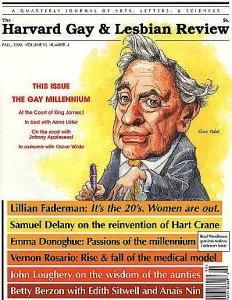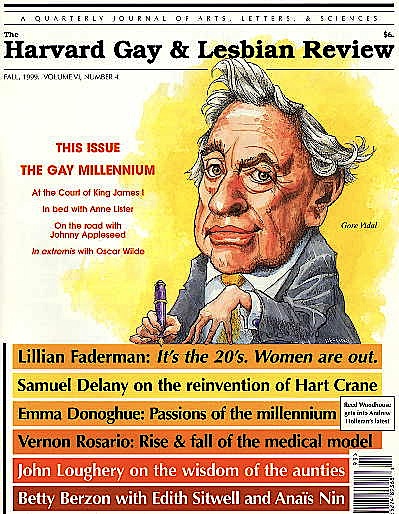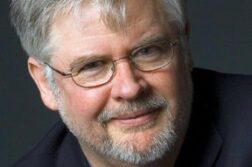VIDAL first visited Australia in 1974 and lunched with Prime Minister Gough Whitlam at the Lodge, where they sparred jocularly over the historical accuracy of Vidal’s novel about the Roman Emperor Julian. Vidal was much taken with Gough, though he remarked that it was difficult to preserve the line between vanity and overweening vanity. The same could be said of Gore Vidal himself.
Whitlam seemed the sort of politician Vidal imagined himself to be, potentially: educated, patrician, and a convinced social democrat. Thirty years later, Vidal was back in Australia, dining with Bob Carr, whom the ABC subsequently persuaded to be filmed driving through Los Angeles with Vidal as he held forth on the evils of the American Empire. One suspects that particular piece of footage is not held in high regard by Carr’s current department.
My connection with Vidal dates from the seizing of his novel Myra Breckinridge in 1971 by a zealous Sydney Airport customs official, which became the basis for a Council of Civil Liberties trial aimed at our then draconian censorship laws. Customs won the case, with Judge Levine concluding that there were passages in the book “introduced for the sake of dirtiness, and from the sure knowledge that notoriety earned by dirtiness will command for the book a ready sale.” Happily, these laws were soon abolished.
Defending Vidal in court proved the basis for a long acquaintanceship, although one limited by my humble position in the literary pantheon. After all, as Vidal once observed, “in the world of stars no one is a stranger.” I was invited to stay at the villa at Ravello, but not, sadly, at the same time as either Princess Margaret or Mick Jagger.
Vidal was always a generous host, as long as he remained the center of attention. During a fifty-year partnership with Howard Austen that stretched from homes north of New York to Rome to Ravello to Los Angeles, he maintained a strict routine: writing in the morning, hunting for sex in the afternoon, dinner with friends in the evening. The routine was interrupted only by travel or by his two attempts to enter politics: his race for a seat in the U.S. Congress from New York seat in 1960, and his even more quixotic campaign for the Democratic primary for a U.S. Senate seat from California in 1982.
Any real possibility of electoral success had probably ended with the publication of his early novel The City and the Pillar (1948), one of a small group of novels—including James Baldwin’s Giovanni’s Room and John Home Burns’ The Gallery—that dared to depict homosexual relations realistically in post-World War II America. Vidal claimed bitterly that he was ostracized by the literary world for that book, but I suspect he published it knowing full well that it would end his ambitions for a political career.
 Vidal insisted that he was bisexual, and often spoke disparagingly of those he referred to as “homosexualists.” Only they and Catholic priests, he once said, were interested in marriage: “But since those who believe in romantic love suffer so much anyway, I would not dream of adding to their sufferings.” Interestingly he revealed his own romantic love for fellow student Jimmie Trimble in both his memoirs Palimpsest and his novel The Smithsonian Institution.
Vidal insisted that he was bisexual, and often spoke disparagingly of those he referred to as “homosexualists.” Only they and Catholic priests, he once said, were interested in marriage: “But since those who believe in romantic love suffer so much anyway, I would not dream of adding to their sufferings.” Interestingly he revealed his own romantic love for fellow student Jimmie Trimble in both his memoirs Palimpsest and his novel The Smithsonian Institution.
Vidal was never able to recognize, as Christopher Isherwood sensibly remarked, that you know you’re homosexual when you fall in love with another man. His public persona, with its mixture of charm and aggression, was in part a product of an inability to fully accept his own sexuality, and he fluctuated between denying he was part of the gay movement and occasionally speaking for it.
When Yukio Mishima died in 1970, Vidal wrote that “friends found him a good companion, a fine drinking partner, and fun to cruise with.” So too was Vidal. We were once on the beach at Amalfi when he gave me hints on how to pick up two young Italians who were lounging nearby. “Offer them money,” he advised, being of the generation who saw paying for sex as a way of denying that either he or his partners were “really” homosexual.
Vidal was a remarkably disciplined and hard-working writer, as is evident from the research behind his historical works, not only the remarkable series about U.S. history, which runs from Burr through Lincoln to The Golden Age, but also Julian and Creation, which grew out of his realization that in one lifetime, five centuries before the rise of Christianity, it would have been possible to meet Buddha, Confucius, Zoroaster, and Socrates.
Conventional wisdom claims that he was best as an essayist, though I suspect some of his critics are too lazy to have read most of his novels. Not only was he a master of the historical genre, he also created some of the blackest satires of contemporary America, such as Duluth and The Smithsonian Institution. And Myra Breckinridge, which subsequently became one of the all time bad films, should be read as the founding text of queer theory, even if it is far too frivolous to appear on graduate school reading lists.
When I was approached some years ago by a publisher to write a book about “a celebrity,” I chose Vidal, a recognizable icon of American intellectual life for half a century. We agreed that I would only show Vidal the manuscript once it was ready for copy editing, and he could only correct factual mistakes. He must have read the manuscript four or five times, and clearly brooded on what he saw as insufficient recognition, but he did agree to appear at two events for the book at bookstores in southern California. By then he was eighty, walked with difficulty, drank too much, and was still mourning the loss of Howard, who had died two years earlier. But the presence of an audience—and Vidal was still able to draw hundreds to bookstores—rekindled the old hunger for adulation.
I learned much from Gore Vidal, not least that if one craves fame, one can never be certain that one is famous enough. I spent considerable time with him when my book, Gore Vidal’s America, was published in November 2005, and there was something very sad about his constant need to reassure himself of his importance, and about the sudden bursts of anger pertaining to hurt feelings and rivalries going back over a long career. On stage, Vidal was witty, imperious, and absolutely unwilling to share the limelight.
As he aged, Vidal grew increasingly bitter with what he saw as the failures of the U.S., which he proclaimed to be a deeply corrupt empire. After Howard’s death he sold the villa in Ravello and moved back to the Hollywood Hills. His last few years were not happy ones, but he would have delighted in all the attention that his death occasioned—including, perhaps, this encomium in a gay and lesbian magazine.




